新概念英语第三册笔记第37课备课讲稿
- 格式:doc
- 大小:149.00 KB
- 文档页数:12
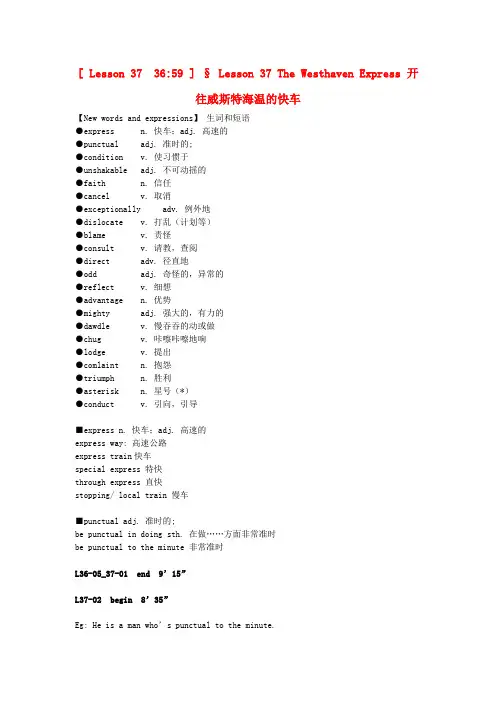
[ Lesson 37 36:59 ] § Lesson 37 The Westhaven Express 开往威斯特海温的快车【New words and expressions】生词和短语●express n. 快车;adj. 高速的●punctual adj. 准时的;●condition v. 使习惯于●unshakable adj. 不可动摇的●faith n. 信任●cancel v. 取消●exceptionally adv. 例外地●dislocate v. 打乱(计划等)●blame v. 责怪●consult v. 请教,查阅●direct adv. 径直地●odd adj. 奇怪的,异常的●reflect v. 细想●advantage n. 优势●mighty adj. 强大的,有力的●dawdle v. 慢吞吞的动或做●chug v. 咔嚓咔嚓地响●lodge v. 提出●comlaint n. 抱怨●triumph n. 胜利●asterisk n. 星号(*)●conduct v. 引向,引导■express n. 快车;adj. 高速的express way: 高速公路express train快车special express 特快through express 直快stopping/ local train 慢车■punctual adj. 准时的;be punctual in doing sth. 在做……方面非常准时be punctual to the minute 非常准时L36-05_37-01 end 9’15”L37-02 beg in 8’35”Eg: He is a man who’s punctual to the minute.punctually adv.unpunctual ant.punctuality n.■condition v. 使习惯于==form a habit inEg: This society has conditioned each of us.be conditioned to 习惯了……Eg: Each of us has been conditioned to the society.The plants has been conditioned to the cold weather here.The cold weather has conditioned the plants here.condition 条件on condition that 在……条件下如果on no condition 在任何情况下,用在句首句子要倒装On no condition must you be late.in good/ bad condition 情况良好/情况糟糕change one's condition 结婚in the interesting condition : 怀孕 pregnant■unshakable adj. 不可动摇的■faith n. 信任keep faith with sb. 对……守信用put one's faith in sth 对……有信心on the faith of 在……的保障下,凭……的信用faith深信不疑,信仰,比belief 程度重一点belief: 可信赖,可接受conviction坚定的信念trust相信,依赖credit对……完全相信■cancel v. 取消call off == cancel 可以互相替换abolish 废除rescind 撤销,废止write off 注销,勾销cross out 划掉■exceptionally adv. 例外地■dislocate v. 打乱(计划等)■blame v. 责怪■consult v. 请教,查阅■direct adv. 径直地■odd adj. 奇怪的,异常的■reflect v. 细想reflect on sth 细想……reflect upon oneself 自我反省■advantage n. 优势take advantage of sb/sth 欺骗……并利用of great/no advantage to sb/sth 对……有(没有)好处to advantage 更有效地have advantage over sb 胜过某人,比某人有优势L37-02 end 8’35”L37-03 begin 9’42”interest 个人的利益,好处benefit 通过正当手段谋求的好处profit 金钱上的获益good 个人或集体的利益■mighty adj. 强大的,有力的■dawdle v. 慢吞吞的动或做■chug v. 咔嚓咔嚓地响■lodge v. 提出make/ lodge complaint 提出抱怨■comlaint n. 抱怨■triumph n. 胜利■asterisk n. 星号(*)■conduct v. 引向,引导【Text】§ Lesson 37 The Westhaven Express 开往威斯特海温的快车Listen to the tape then answer the question below.What was the mistake the author made?We have learnt to expect that trains will be punctual. After years of conditioning, most of us have developed an unshakable faith in railway timetables. Ships may be delayed by storms; air flights may be cancelled because of bad weather; but trains must be on time. Only an exceptionally heavy snow fall might temporarily dislocate railway services. It is all too easy to blame the railway authorities when somethingdoes go wrong. The truth is that when mistakes occur, they are more likely to be ours than theirs.After consulting my railway timetable, I noted with satisfaction that there wasan express train to Westhaven. It went direct from my local station and the journey lasted a mere hour and seventeen minutes. When I boarded the train, I could not help noticing that a great many local people got on as well. At the time, this did not strike me as odd. I reflected that there must be a great many people besides myself who wished to take advantage of this excellent service. Neither was I surprised when the train stopped at Widley, a tiny station a few miles along the line. Even a mighty express train can be held up by signals. But when the train dawdled at station after station, I began to wonder. It suddenly dawned on me that this express was not roaring down the line at ninety miles an hour, but barely chugging along at thirty. One hour and seventeen minutes passed and we had not even covered half the distance. I askeda passenger if this was the Westhaven Express, but he had not even heard of it. I determined to lodge a complaint as soon as we arrived. Two hours later, I was talking angrily to the station master at Westhaven. When he denied the train's existence, I borrowed his copy of the timetable. There was a note of triumph in my voice whenI told him that it was there in black and white. Glancing at it briefly, he told me to look again. A tiny asterisk conducted me to a footnote at the bottom of the page. It said: 'This service has been suspended.'参考译文我们已经习惯于相信火车总是准点的。
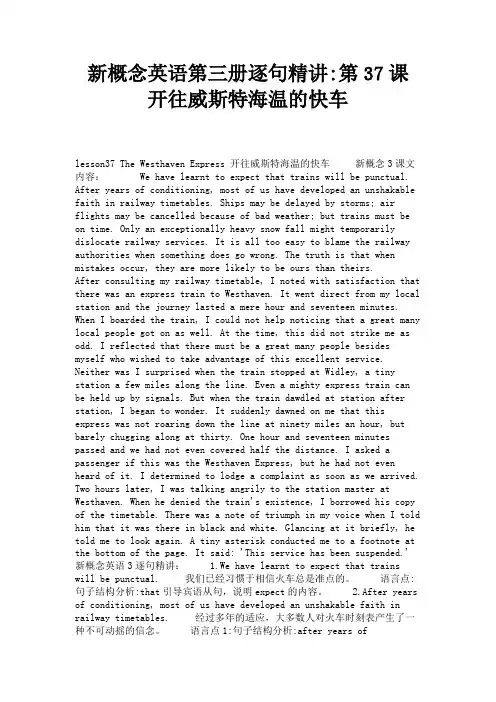
新概念英语第三册逐句精讲:第37课开往威斯特海温的快车lesson37 The Westhaven Express 开往威斯特海温的快车新概念3课文内容:We have learnt to expect that trains will be punctual. After years of conditioning, most of us have developed an unshakable faith in railway timetables. Ships may be delayed by storms; air flights may be cancelled because of bad weather; but trains must be on time. Only an exceptionally heavy snow fall might temporarily dislocate railway services. It is all too easy to blame the railway authorities when something does go wrong. The truth is that when mistakes occur, they are more likely to be ours than theirs.After consulting my railway timetable, I noted with satisfaction that there was an express train to Westhaven. It went direct from my local station and the journey lasted a mere hour and seventeen minutes. When I boarded the train, I could not help noticing that a great many local people got on as well. At the time, this did not strike me as odd. I reflected that there must be a great many people besides myself who wished to take advantage of this excellent service. Neither was I surprised when the train stopped at Widley, a tiny station a few miles along the line. Even a mighty express train can be held up by signals. But when the train dawdled at station after station, I began to wonder. It suddenly dawned on me that this express was not roaring down the line at ninety miles an hour, but barely chugging along at thirty. One hour and seventeen minutes passed and we had not even covered half the distance. I asked a passenger if this was the Westhaven Express, but he had not even heard of it. I determined to lodge a complaint as soon as we arrived. Two hours later, I was talking angrily to the station master at Westhaven. When he denied the train's existence, I borrowed his copy of the timetable. There was a note of triumph in my voice when I told him that it was there in black and white. Glancing at it briefly, he told me to look again. A tiny asterisk conducted me to a footnote at the bottom of the page. It said: 'This service has been suspended.' 新概念英语3逐句精讲: 1.We have learnt to expect that trainswill be punctual. 我们已经习惯于相信火车总是准点的。
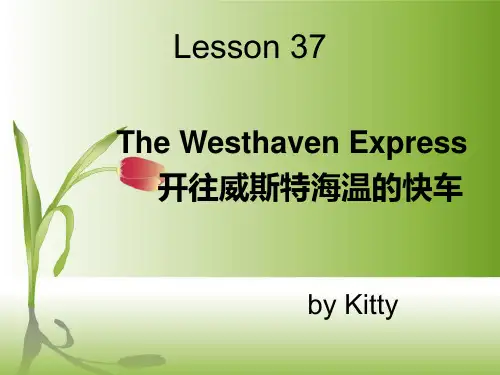
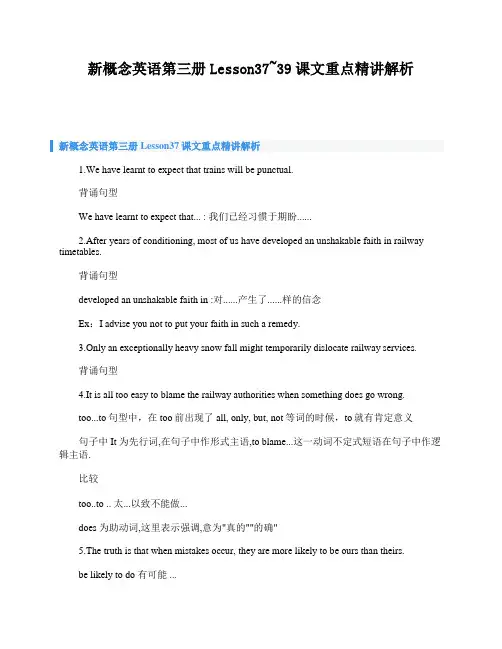
新概念英语第三册Lesson37~39课文重点精讲解析新概念英语第三册Lesson37课文重点精讲解析1.We have learnt to expect that trains will be punctual.背诵句型We have learnt to expect that... : 我们已经习惯于期盼......2.After years of conditioning, most of us have developed an unshakable faith in railway timetables.背诵句型developed an unshakable faith in :对......产生了......样的信念Ex:I advise you not to put your faith in such a remedy.3.Only an exceptionally heavy snow fall might temporarily dislocate railway services.背诵句型4.It is all too easy to blame the railway authorities when something does go wrong.too...to句型中,在too前出现了all, only, but, not等词的时候,to就有肯定意义句子中It 为先行词,在句子中作形式主语,to blame...这一动词不定式短语在句子中作逻辑主语.比较too..to .. 太...以致不能做...does 为助动词,这里表示强调,意为"真的""的确"5.The truth is that when mistakes occur, they are more likely to be ours than theirs.be likely to do 有可能 ...Ex:You are likely to get success if you work hard.It is likely that...It is likely that he arrived here in time.when 为从属连词,在 that引导的从句中引导一个时间状语从句ours & theirs均为斜体,表强调. ours=our mistakes, theirs=their mistakes.6.After consulting my railway timetable, I noted with satisfaction that there was an express train to Westhaven.After 后,直接使用分词短语,在句中作时间状语.Ex:After talking to you I always feel better.with satisfaction 满意地. 为介词"with+抽象名词"构成的短语结构, 作状语,修饰noted . 句中 that为关系连词,引导其后的宾语从句.7.It went direct from my local station and the journey lasted a mere hour and seventeen minutes.direct from...to... 直接从...到...8.When I boarded the train, I could not help noticing that a great many local people got on as well. At the time, this did not strike me as odd.could not help doing...禁不住做...其后接名词,代词,或动名词Ex:Many poeple can't help admiring the picture when they look at it.strike sb as 给某人以......印象,使某人感到; as后面可以接分词、名词、形容词搭配连用。
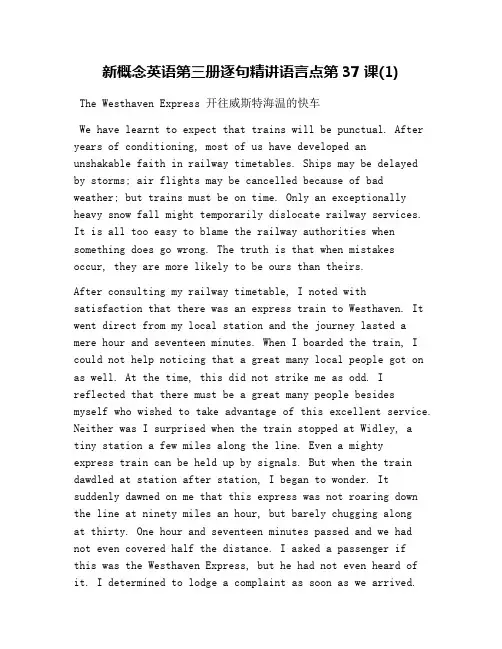
新概念英语第三册逐句精讲语言点第37课(1)The Westhaven Express 开往威斯特海温的快车We have learnt to expect that trains will be punctual. After years of conditioning, most of us have developed anunshakable faith in railway timetables. Ships may be delayedby storms; air flights may be cancelled because of bad weather; but trains must be on time. Only an exceptionally heavy snow fall might temporarily dislocate railway services. It is all too easy to blame the railway authorities when something does go wrong. The truth is that when mistakes occur, they are more likely to be ours than theirs.After consulting my railway timetable, I noted withsatisfaction that there was an express train to Westhaven. It went direct from my local station and the journey lasted a mere hour and seventeen minutes. When I boarded the train, I could not help noticing that a great many local people got on as well. At the time, this did not strike me as odd. I reflected that there must be a great many people besidesmyself who wished to take advantage of this excellent service. Neither was I surprised when the train stopped at Widley, a tiny station a few miles along the line. Even a mightyexpress train can be held up by signals. But when the train dawdled at station after station, I began to wonder. It suddenly dawned on me that this express was not roaring down the line at ninety miles an hour, but barely chugging alongat thirty. One hour and seventeen minutes passed and we hadnot even covered half the distance. I asked a passenger ifthis was the Westhaven Express, but he had not even heard of it. I determined to lodge a complaint as soon as we arrived.Two hours later, I was talking angrily to the station masterat Westhaven. When he denied the train's existence, Iborrowed his copy of the timetable. There was a note oftriumph in my voice when I told him that it was there inblack and white. Glancing at it briefly, he told me to look again. A tiny asterisk conducted me to a footnote at the bottom of the page. It said: 'This service has been suspended.'1.We have learnt to expect that trains will be punctual.我们已经习惯于相信火车总是准点的。
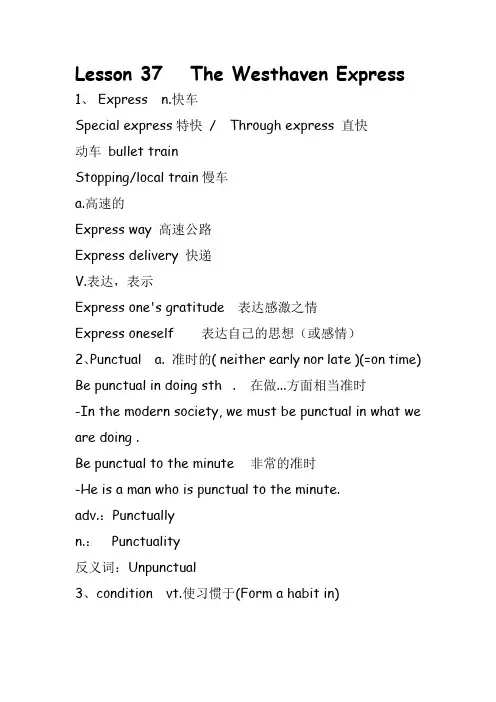
Lesson 37 The Westhaven Express 1、Express n.快车Special express特快/ Through express 直快动车bullet trainStopping/local train慢车a.高速的Express way 高速公路Express delivery 快递V.表达,表示Express one's gratitude 表达感激之情Express oneself 表达自己的思想(或感情)2、Punctual a. 准时的( neither early nor late )(=on time) Be punctual in doing sth . 在做...方面相当准时-In the modern society, we must be punctual in what we are doing .Be punctual to the minute 非常的准时-He is a man who is punctual to the minute.adv.:Punctuallyn.:Punctuality反义词:Unpunctual3、condition vt.使习惯于(Form a habit in)-这个社会已经使我们大家都适应了。
-Society has conditioned each one of us.Be condition to(=be accustomed to)-Each one of us has been conditioned to society.-The plants have been conditioned to the cold weather here. ( plant 做主语)-The cold weather has conditioned the plants here. (cold weather 做主语)n. 条件on condition that 在……条件下-He will help you on condition that you ask for help.on no condition 在任何情况下都不(用在句首句子必须采用倒装)-在任何情况下都不能迟到。
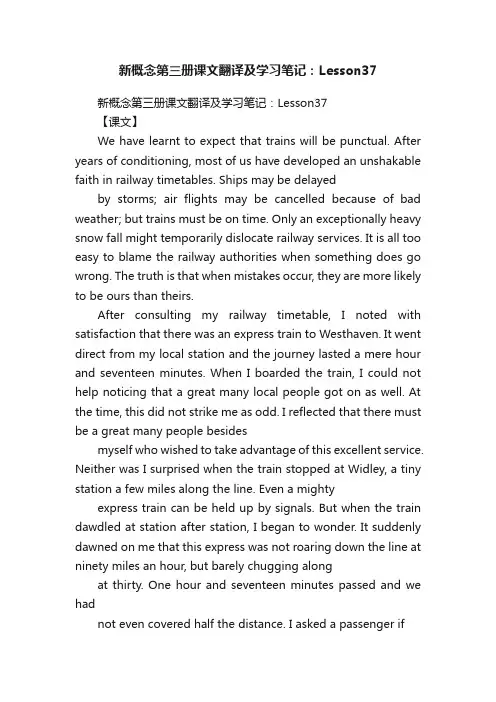
新概念第三册课文翻译及学习笔记:Lesson37新概念第三册课文翻译及学习笔记:Lesson37【课文】We have learnt to expect that trains will be punctual. After years of conditioning, most of us have developed an unshakable faith in railway timetables. Ships may be delayedby storms; air flights may be cancelled because of bad weather; but trains must be on time. Only an exceptionally heavy snow fall might temporarily dislocate railway services. It is all too easy to blame the railway authorities when something does go wrong. The truth is that when mistakes occur, they are more likely to be ours than theirs.After consulting my railway timetable, I noted with satisfaction that there was an express train to Westhaven. It went direct from my local station and the journey lasted a mere hour and seventeen minutes. When I boarded the train, I could not help noticing that a great many local people got on as well. At the time, this did not strike me as odd. I reflected that there must be a great many people besidesmyself who wished to take advantage of this excellent service. Neither was I surprised when the train stopped at Widley, a tiny station a few miles along the line. Even a mightyexpress train can be held up by signals. But when the train dawdled at station after station, I began to wonder. It suddenly dawned on me that this express was not roaring down the line at ninety miles an hour, but barely chugging alongat thirty. One hour and seventeen minutes passed and we hadnot even covered half the distance. I asked a passenger ifthis was the Westhaven Express, but he had not even heard of it. I determined to lodge a complaint as soon as we arrived.Two hours later, I was talking angrily to the station masterat Westhaven. When he denied the train's existence, Iborrowed his copy of the timetable. There was a note oftriumph in my voice when I told him that it was there inblack and white. Glancing at it briefly, he told me to look again. A tiny asterisk conducted me to a footnote at the bottom of the page. It said: 'This service has been suspended.' 【课文翻译】我们已经习惯于相信火车总是准点的。
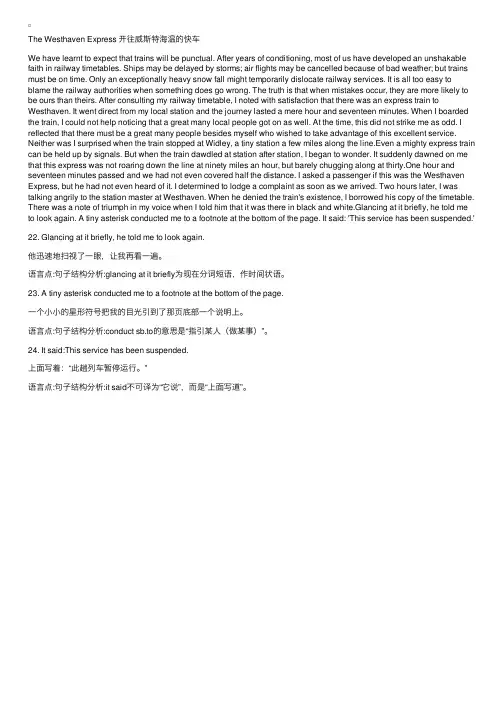
The Westhaven Express 开往威斯特海温的快车We have learnt to expect that trains will be punctual. After years of conditioning, most of us have developed an unshakable faith in railway timetables. Ships may be delayed by storms; air flights may be cancelled because of bad weather; but trains must be on time. Only an exceptionally heavy snow fall might temporarily dislocate railway services. It is all too easy to blame the railway authorities when something does go wrong. The truth is that when mistakes occur, they are more likely to be ours than theirs. After consulting my railway timetable, I noted with satisfaction that there was an express train to Westhaven. It went direct from my local station and the journey lasted a mere hour and seventeen minutes. When I boarded the train, I could not help noticing that a great many local people got on as well. At the time, this did not strike me as odd. I reflected that there must be a great many people besides myself who wished to take advantage of this excellent service. Neither was I surprised when the train stopped at Widley, a tiny station a few miles along the line.Even a mighty express train can be held up by signals. But when the train dawdled at station after station, I began to wonder. It suddenly dawned on me that this express was not roaring down the line at ninety miles an hour, but barely chugging along at thirty.One hour and seventeen minutes passed and we had not even covered half the distance. I asked a passenger if this was the Westhaven Express, but he had not even heard of it. I determined to lodge a complaint as soon as we arrived. Two hours later, I was talking angrily to the station master at Westhaven. When he denied the train's existence, I borrowed his copy of the timetable. There was a note of triumph in my voice when I told him that it was there in black and white.Glancing at it briefly, he told me to look again. A tiny asterisk conducted me to a footnote at the bottom of the page. It said: 'This service has been suspended.' 22. Glancing at it briefly, he told me to look again.他迅速地扫视了⼀眼,让我再看⼀遍。
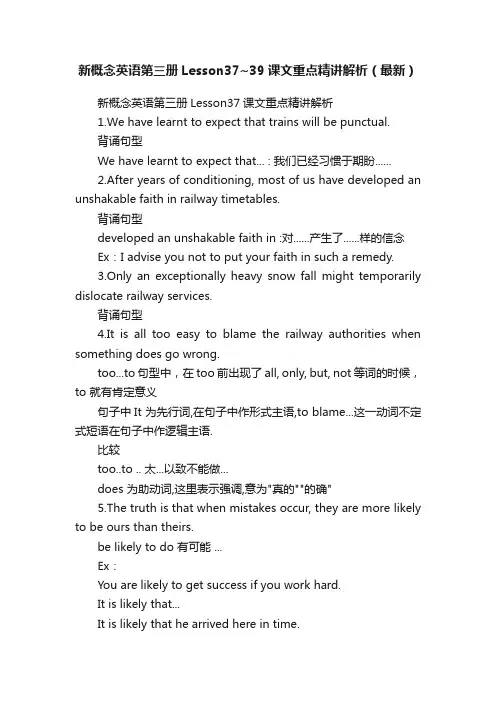
新概念英语第三册Lesson37~39课文重点精讲解析(最新)新概念英语第三册Lesson37课文重点精讲解析1.We have learnt to expect that trains will be punctual.背诵句型We have learnt to expect that... : 我们已经习惯于期盼......2.After years of conditioning, most of us have developed an unshakable faith in railway timetables.背诵句型developed an unshakable faith in :对......产生了......样的信念Ex:I advise you not to put your faith in such a remedy.3.Only an exceptionally heavy snow fall might temporarily dislocate railway services.背诵句型4.It is all too easy to blame the railway authorities when something does go wrong.too...to句型中,在too前出现了all, only, but, not等词的时候,to 就有肯定意义句子中It 为先行词,在句子中作形式主语,to blame...这一动词不定式短语在句子中作逻辑主语.比较too..to .. 太...以致不能做...does 为助动词,这里表示强调,意为"真的""的确"5.The truth is that when mistakes occur, they are more likely to be ours than theirs.be likely to do 有可能 ...Ex:You are likely to get success if you work hard.It is likely that...It is likely that he arrived here in time.when 为从属连词,在 that引导的从句中引导一个时间状语从句ours & theirs均为斜体,表强调. ours=our mistakes, theirs=their mistakes.6.After consulting my railway timetable, I noted with satisfaction that there was an express train to Westhaven.After 后,直接使用分词短语,在句中作时间状语.Ex:After talking to you I always feel better.with satisfaction 满意地. 为介词"with+抽象名词"构成的短语结构, 作状语,修饰noted . 句中 that为关系连词,引导其后的宾语从句.7.It went direct from my local station and the journey lasteda mere hour and seventeen minutes.direct from...to... 直接从...到...8.When I boarded the train, I could not help noticing that a great many local people got on as well. At the time, this did not strike me as odd.could not help doing...禁不住做...其后接名词,代词,或动名词Ex:Many poeple can't help admiring the picture when they look at it.strike sb as 给某人以......印象,使某人感到; as后面可以接分词、名词、形容词搭配连用。
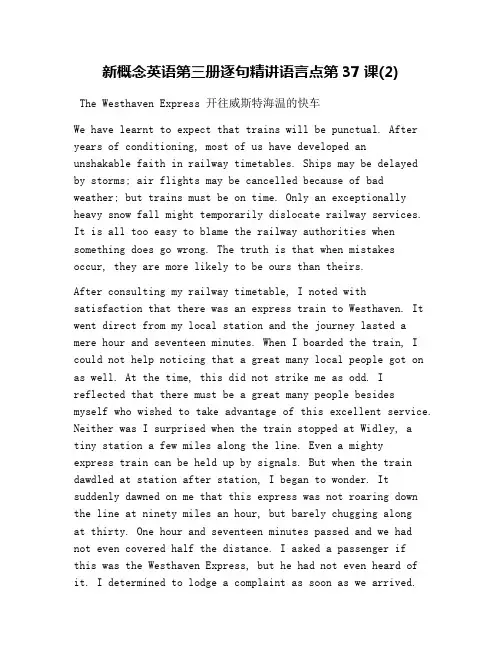
新概念英语第三册逐句精讲语言点第37课(2)The Westhaven Express 开往威斯特海温的快车We have learnt to expect that trains will be punctual. After years of conditioning, most of us have developed anunshakable faith in railway timetables. Ships may be delayedby storms; air flights may be cancelled because of bad weather; but trains must be on time. Only an exceptionally heavy snow fall might temporarily dislocate railway services. It is all too easy to blame the railway authorities when something does go wrong. The truth is that when mistakes occur, they are more likely to be ours than theirs.After consulting my railway timetable, I noted withsatisfaction that there was an express train to Westhaven. It went direct from my local station and the journey lasted a mere hour and seventeen minutes. When I boarded the train, I could not help noticing that a great many local people got on as well. At the time, this did not strike me as odd. Ireflected that there must be a great many people besidesmyself who wished to take advantage of this excellent service. Neither was I surprised when the train stopped at Widley, atiny station a few miles along the line. Even a mightyexpress train can be held up by signals. But when the train dawdled at station after station, I began to wonder. It suddenly dawned on me that this express was not roaring down the line at ninety miles an hour, but barely chugging alongat thirty. One hour and seventeen minutes passed and we hadnot even covered half the distance. I asked a passenger ifthis was the Westhaven Express, but he had not even heard of it. I determined to lodge a complaint as soon as we arrived.Two hours later, I was talking angrily to the station master at Westhaven. When he denied the train's existence, I borrowed his copy of the timetable. There was a note of triumph in my voice when I told him that it was there in black and white. Glancing at it briefly, he told me to look again. A tiny asterisk conducted me to a footnote at the bottom of the page. It said: 'This service has been suspended.'4.Only an exceptionally heavy snow fall might temporarily dislocate railway services.只有非同寻常的大雪才可能暂时打乱铁路运行。
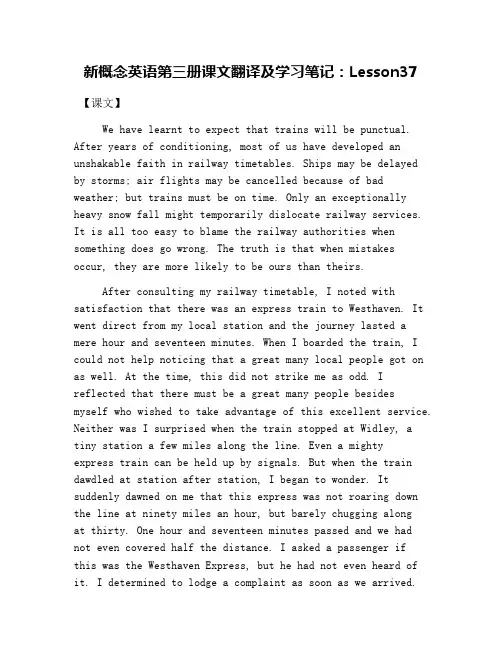
新概念英语第三册课文翻译及学习笔记:Lesson37【课文】We have learnt to expect that trains will be punctual. After years of conditioning, most of us have developed an unshakable faith in railway timetables. Ships may be delayedby storms; air flights may be cancelled because of bad weather; but trains must be on time. Only an exceptionally heavy snow fall might temporarily dislocate railway services. It is all too easy to blame the railway authorities when something does go wrong. The truth is that when mistakes occur, they are more likely to be ours than theirs.After consulting my railway timetable, I noted with satisfaction that there was an express train to Westhaven. It went direct from my local station and the journey lasted a mere hour and seventeen minutes. When I boarded the train, I could not help noticing that a great many local people got on as well. At the time, this did not strike me as odd. I reflected that there must be a great many people besidesmyself who wished to take advantage of this excellent service. Neither was I surprised when the train stopped at Widley, a tiny station a few miles along the line. Even a mightyexpress train can be held up by signals. But when the train dawdled at station after station, I began to wonder. It suddenly dawned on me that this express was not roaring down the line at ninety miles an hour, but barely chugging alongat thirty. One hour and seventeen minutes passed and we hadnot even covered half the distance. I asked a passenger ifthis was the Westhaven Express, but he had not even heard of it. I determined to lodge a complaint as soon as we arrived.Two hours later, I was talking angrily to the station masterat Westhaven. When he denied the train's existence, Iborrowed his copy of the timetable. There was a note oftriumph in my voice when I told him that it was there inblack and white. Glancing at it briefly, he told me to look again. A tiny asterisk conducted me to a footnote at the bottom of the page. It said: 'This service has been suspended.'【课文翻译】我们已经习惯于相信火车总是准点的。
新概念英语第三册逐句精讲语言点第37课(1) The Westhaven Express 开往威斯特海温的快车We have learnt to expect that trains will be punctual. Afteryears of conditioning, most of us have developed anunshakable faith in railway timetables. Ships may be delayedby storms; air flights may be cancelled because of badweather; but trains must be on time. Only an exceptionallyheavy snow fall might temporarily dislocate railway services.It is all too easy to blame the railway authorities whensomething does go wrong. The truth is that when mistakes occur, they are more likely to be ours than theirs.After consulting my railway timetable, I noted withsatisfaction that there was an express train to Westhaven. Itwent direct from my local station and the journey lasted amere hour and seventeen minutes. When I boarded the train, I could not help noticing that a great many local people got onas well. At the time, this did not strike me as odd. Ireflected that there must be a great many people besidesmyself who wished to take advantage of this excellent service. Neither was I surprised when the train stopped at Widley, atiny station a few miles along the line. Even a mightyexpress train can be held up by signals. But when the train dawdled at station after station, I began to wonder. Itsuddenly dawned on me that this express was not roaring down the line at ninety miles an hour, but barely chugging alongat thirty. One hour and seventeen minutes passed and we hadnot even covered half the distance. I asked a passenger ifthis was the Westhaven Express, but he had not even heard ofit. I determined to lodge a complaint as soon as we arrived.Two hours later, I was talking angrily to the station masterat Westhaven. When he denied the train's existence, Iborrowed his copy of the timetable. There was a note oftriumph in my voice when I told him that it was there inblack and white. Glancing at it briefly, he told me to lookagain. A tiny asterisk conducted me to a footnote at thebottom of the page. It said: 'This service has beensuspended.'1.We have learnt to expect that trains will be punctual.我们已经习惯于相信火车总是准点的。
新概念英语课堂笔记Lesson37:OnTellingtheTr新概念英语课堂笔记 Lesson37:On Telling the TruthLesson 37 On Telling the Truth 论讲真话The Victorians, realizing that the greatest Happiness accorded to man is that provided by a happy marriage, endeavoured to pretend that all their marriages were happy. We, for our part, admitting the fact that no feat of intelligence and character is so exacting as that required of two people who desire to live permanently together on a basis of amity, are obsessed by the problem of how to render the basic facts of cohabitation simpler and more reasonable, in order that unhappy marriages may less frequently result. The Victorians would have considered it 'painful' or 'unpleasant' were one to point out that only four marriages out of every ten are anything but forced servitudes. We ourselves start from this very assumption and try to build from it a theory of more sensible relations between the sexes. Of all forms of arrant untruthfulness Victorian optimism appears to me to have been the most cowardly and the most damaging.Truth, therefore, is an attitude of the mind. lt is important, if one does not wish to inconvenience and to bore one's friends, not to tell lies. But it is more important not to think lies, or to slide into those mechanical and untruthful habits of thought which are so pleasant and so easy as descents to mental ineptitude. The victorian habit of mind (which I consider to have been a bad habit of mind) was unduly preoccupied by what was socially and morally convenient. Convenience is, however, in all affairs of life, an execrable test of value. One should have the courage to think uncomfortably, since it is only by rejecting theconvenient that one can come to think the truth. Not, after all, that there is any such thing as truth. At best we can approach to some relative approximation. On the other hand, there is surely such a thing as untruth. One is generally aware when one has said something, or acted in some way which has left on other people an impressionnot strictly in accordance with the facts. One is generally aware, also. when one has thrust aside an inconvenient thought and slid into its place another thought which is convenient. One's awareness in the former case is in general more acute than in the latter, since we are more on the look-out for the lies we utter than for those we merely think. In fact, however, it is the untruthful thought which is the more vicious of the two. Spoken lies are invariably tiresome and may actually be dishonest. But continuous lying in the mind, a disease to which the Anglo-Saxon is peculiarly exposed, spells the destruction of human thought and character.New words and expressions 生词短语(改正)Victoria (1837-1901)前期是 unrest, alarm.后期 growing prosperityindustrialism 工业革命 free trade 自由贸易Britain was named workshop of the world.cession of Hongkong to U.K.cession 割让opium war 战争critical realism 批判现实主义made big fortune = made good moneyCharles Dickenshard times 艰难时事middle class 中产阶级The Tale of Two Cities 双城记Oliver Twist 雾都孤儿Vanity Fair 名利场status 地位rank 头衔乔治。
新概念英语第三册笔记第 3 7 课Lesson 37 The Westhaven Express 开往威斯特海温的快车New words and expressi on 生词和短语1. Express n.快车;a.高速的(ad.快递地send it ~ vt 1、表达2、(想法、情感)流露;呈现)Express way高速公路/ Express train快车Special express特快/ express coach长途汽车express service快车express post快件express mail快件express delivery快递express compa ny 快递公司2. Punctual a.准时的(=neither early nor late )--I n the moder n society, we must be pun ctual in what we are doing .Be punctual to the minute 非常的准时--He is a man who is punctual to the minute.副词:Punctually反义词:Unpunctual名词:Punctuality [,p??ktj?'?l ??Promptly adv.准时地[pr?mptli] 1、迅速地(quickly);立即(immediately) 2、及时地;准时地--He was so sleepy that he went to sleep promptly.on time 准时/ in time 及时punctual (adj.严守时刻的,准时的)[p??kt?u?l] punctually adv.守时地prompt 1、引起、促使、推动、导致to makesb decide to do sth; to caussth to happe n provoke 1、[VN]激起;引起;引发to cause aparticular reacti on or have aparticular effect2、~ sb (into sth/into doing sth)挑衅;激怒;刺激3. Condition vt.使习惯于(二Form a habit in)(习惯于(以某种方式做事或思考)[usu passive]使适应;以…为条件)--Society has con diti oned each one of us. 这个社会已经使我们大家都适应了。
Lesson37 Making a bookcase讲义重点一、本课重要单词hard: adv.努力地;work: v.工作;记住以下几个关于work的词组,work hard:努力工作;hard work:艰苦的工作;hard-working:勤奋的,努力的;区分好work与job:work,我们广义指“工作”,job,我们更多用来指一份职业。
work基本是不可数的,job一般都是可数名词,一份或者两份职业。
例:That’s hard work. 那是艰苦的工作(做名词讲是不可数名词)He has a good job in the bank. 他在银行里有一份很好的工作。
(job可数名词)。
make: v.做;make the coffee煮咖啡;make the bed 铺床;make a meal 做饭;make up:化妆;bookcase: n.书橱,书架;book相关的几个重要单词或短语:book shelf书架;bookshop书店;bookstore书店;book mark书签。
hammer: n.锤子;pink: n/adj.粉红色(的);paint: v.上漆,绘,画;paint the bookcase red:把书橱漆红;paint the wall white 把墙刷成白色。
favourite: adj.最喜欢的;一个常见的句型:What is your favourite+名词:你最喜欢的东西是什么?二、本课重要知识点1. What are you going to do now? 你现在打算干什么?be going to do:按计划、打算去做、、、、,是一般将来时的结构之一,在本句中我们需要系统掌握一般将来时的用法:一般将来时表示将要发生的动作或存在的状态及打算、计划或准备去做某事。
基本结构一般将来时主要有以下两种基本结构:①be going to+动词原形:例:I am going to go swimming tomorrow afternoon.明天下午我将会去游泳。
Lesson 37 The Westhaven Express 开往威斯特海温的快车New words and expression 生词和短语1. Express n.快车;a..高速的(ad. 快递地send it ~ vt 1、表达2、(想法、情感) 流露; 呈现)Express way 高速公路/ Express train快车Special express特快/ express coach长途汽车express service快车express post快件express mail快件express delivery快递express company 快递公司2. Punctual a. 准时的( = neither early nor late )--In the modern society, we must be punctual in what we are doing .Be punctual to the minute非常的准时--He is a man who is punctual to the minute.副词:Punctually反义词:Unpunctual名词:Punctuality [,pʌŋktjʊ'ælɪtɪ]Promptly adv.准时地[‘prɒmptli] 1、迅速地(quickly);立即(immediately)2、及时地;准时地-- He was so sleepy that he went to sleep promptly.on time 准时/in time 及时punctual(adj.严守时刻的, 准时的)[‘pʌŋktʃuəl] punctually adv.守时地prompt 1、引起、促使、推动、导致to make sb decide to do sth; to cause sth to happenprovoke 1、[VN] 激起;引起;引发to cause a particular reaction or have a particular effect2、~ sb (into sth/into doing sth) 挑衅;激怒;刺激3. Condition vt.使习惯于(=Form a habit in)(习惯于(以某种方式做事或思考) [usu passive] 使适应;以…为条件)--Society has conditioned each one of us. 这个社会已经使我们大家都适应了。
Be condition to sth--Each one of us has been conditioned to society.--the plants have been conditioned to the cold weather here.. ( plant 做主语)--The cold weather has conditioned the plants here. (cold weather 做主语)1) (专业或贬义)训练,使…有反应condition to do stheg. The animals are conditioned to expect food at the sound of the bell. 被训练得习惯一听到铃声就想吃食物。
eg. People are conditioned by the society they live in. 人们都习惯于适应所生活的社会空间。
2) to control or decide 决定,取决eg. The amount of money I spend is conditioned by the amount I earn. 我花多少钱要看我收入多少而定。
adapt v.渐渐适应adapt to适应eg. It is hard for a person who lives in northern countries to adopt to octopus.adapt for 改编,改作(他用)eg. The original has been adapted for a soap opera. 原著被改编成了一部肥皂剧。
eg. An old house was adapted for a garage. 一间旧房子被改成了车库。
adjust v. 调整,校准,以适应(to make small changes especially to its position to make it more effective)eg. My eyes haven’t adjusted to the dark yet. 介词toeg. The desks and seats must be adjusted to the height of any child. 桌椅必须调整以适应孩子们得高度。
settle in/settle into 适应,融入新环境(to become used to a new home, job, surroundings)eg. It took me 3 weeks to settle into life at college.n. 条件(情况,状态,条件)on condition that 在……条件下如果on no condition 在任何情况下都不(用在句首句子必须采用倒装)--On no condition must you be late. 在任何情况下都不能迟到。
4. unshakable a. 不可动摇的(坚定不移的)adj. 不可动摇的;坚定不移的unalterable , unpersuadableshakable 可动摇的;可震动的;可摇动的shake ( shaking, shook, shaken, shakes )vt. 动摇;摇动;震动;握手vi. 动摇;摇动;发抖n. 摇动;哆嗦milk shaketremble 颤抖,发抖,指因寒冷、情绪变化、体弱多病而不由自主轻微地抖动。
如:A poor old woman stood at the corner, trembling with age.shake 颤抖,颤动,指任何短促而急促的摇动,有时喻指对决心,信念的动摇。
如:He was shaking with fear.(他吓得发抖。
) Nothing can shake our determination.shiver 战栗,寒战,指因寒冷,恐惧或体弱多病而引起的抖动。
如:The old man stood shivering in the wind-swept street.(这位老人站在寒风凛冽的街上发抖。
)5. faith n.信任=strong belief/trust 深信不疑,信仰,信心(n. 信仰;信念;信任;忠实)faithful忠实的,忠诚的;如实的;准确可靠的faithless不忠实的;无信的;无宗教信仰的词汇比较:faith 语气较强,深信不疑,有时也能仅凭感觉产生的相信。
信仰(比belief 程度更重一些)belief 可信赖,可接受,普通用词,指单纯从主观上的相信,不着重这种相信是否有根据。
conviction坚定的信念,根据长期交往或实践,对某人某事有了认识和了解后产生的信心和相信,侧重其坚定性。
trust 相信,依赖(强调相信、信任的完全可靠。
)credit 语气最弱,着重以声誉为信任的基础。
--I have full credit in your ability to do this job.6. cancel v.取消(to stop sth. planned from happening)事先计划好的事物reschedulecancel an appointment --we have to cancel the appointment.cancel a meeting词汇比较:Call off 取消,解除(可以替换cancel)Abolish 废除(to officially end a law, system especially one that has existed for a long time)--The law was abolished. abolish racial segregation 废除种族隔离Rescind [rɪ'sɪnd] vt撤销,废止,废除,比abolish正式(非常正式的一个词,文件,公约常用)Write off 注销,勾销--Write off the name. 注销这个名字。
Cross out 划掉--The word here is useless, please cross it out.deprive sb of sth 剥夺,取消,丧失eg. The criminal was deprived of his political rights.eg. The kid was deprived of parents in a train accident.7. exceptionally adv. 例外地(异常地;特殊地;例外地)词根:exceptadj. exceptional 异常的,例外的conj. except 除了;要不是except that 除了…之外上节课学的:assuming 特殊的连词conj.假定认为…assuming that considering that given that等prep.except 除…之外8. dislocate ['dɪsləkeɪt] v. 打乱(计划等)(本意是vt. 使脱臼(不能正常运转发挥功能);然后,使混乱,扰乱)1) to spoil a plan, system, service etc., so that it cannot work normallydislocate a plan 打乱计划dislocate a system dislocate serviceput a plan out of order 打乱一个计划dislocate business 破坏生意dislocate machinery2)to put a bone out of place 使关节脱臼eg. He fell from his horse and dislocated his collar bone. 他从马上跌下而使锁骨脱臼了。
9. blame v. 责怪(vt. 责备;归咎于n. 责备;责任;过失)1、归咎于Blame sb for sth 归咎于(for后加结果for something bad)blame the army for the chaosBlame sth on sth 归咎于(on后加原因blame something bad on sb/sth)blame the breakdown on the schedule2、责备,责怪blame sb for sth/doing sth I do not blame them for trying to make some money.3、动词词组:该受责备be to blame (for)(主动表被动)If their forces were not involved, then who is to blame?4、n. 责备,及引申出“严重或程度高时”的“(事故、过失等的) 责任”take the blame for 承担责任I'm not going to take the blame for a mistake he made.10. consult v.请教,查阅1) to ask sb. for information or advice as a professional who is supposed to know about it请教,征求意consult his doctor找医生诊治consult a dictionary 查字典consult a map 查地图2) to ask for someone’s permission or to discuss sth. with someone so that you can make a decis ion together consult with 和…商议eg. I’ll consult with my parent’s before I make a decision.11. direct adv.径直地(without stopping or changing direction or without dealing with anyone else first)fly direct to Chicago 直飞芝加哥contact the manager direct 直接与经理联系eg. It’s usually cheaper to buy the goods direct from the wholesaler.directly直率地,直截了当地speak directly ask directly answer directlyeg. She seems to have something on her mind, but wouldn’t speak directly.这两个副词都有“直接地”之意。